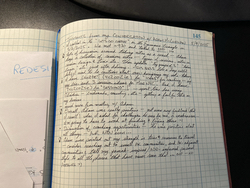I’m not certain, but this probably will only make sense if you are a certain age, and grew up in a house with a garage. It doesn’t need to have been “dad’s garage,” nor a space dedicated to fixing things, nor even sheltered an automobile. No, it only matters that you grew up in a house with a garage.
There’s magic in having an indoor space with a concrete floor. A floor that clearly has taken a beating, and is ready for more abuse. A space with a slightly different sort of door dividing it from the soft and people-oriented rest of the house. A space where things were maybe a little less organized, but definitely were more out in plain sight. Maybe there was some sort of workbench? Maybe some tools. Maybe a lot of tools? Regardless, pretty much all the “where should we put this?” stuff wound up in the garage. Painting something? Garage. Taking something part? Not on the carpet! …in the garage. Fixing your bike? New wheels on your skate board? You get the idea. You either know what I’m talking about, or you don’t.
Did you do, whatever you did, with the garage door open, or closed? Weather permitting, throwing open that garage door was an invitation to the world—but hopefully, only the nice neighbors—to saunter up and at least watch. Turns out, that’s literally “showing your work.” A huge part of what I’m doing these days is working where I can be seen. There’s collateral recognition of course, but mostly it’s just scratching an itch to toss things on a workbench and throw open the ‘ol garage door.
If you know what I’m talking about, you can even hear that door opening.
ɕ


